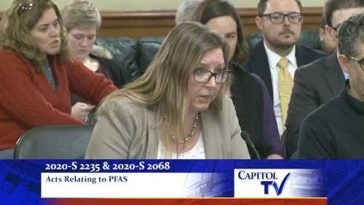
As federal regulations continue to be at a stalemate, many states are moving forward to enact legislation to regulate PFAS within their borders. The state of Massachusetts has recently proposed to set the PFAS drinking water Maximum Contaminate Level (MCL) to a sum concentration of 20 parts per thousand for six different PFAS compounds. The Massachusetts Department of Environmental Protection held a public hearing in January of 2020 to discuss this proposed drinking water standard. Dr. Laurel Schaider (lead researcher at the Silent Spring Institute and co-lead of STEEP’s Community Engagement Core) and Cheryl Osimo (Silent Spring Institute Cape Cod Outreach Coordinator and Massachusetts Breast Cancer Coalition Executive Director) testified supporting the proposed drinking water standard. Dr. Schaider also emphasized the importance of testing for and regulating other PFAS compounds beyond PFOA and PFOS, and strongly backed the inclusion of PFHxS, PFNA, PFHpA, and PFDA in the new MCL. STEEP researchers also submitted written comments in February 2020 to inform the standard-setting process.

In Rhode Island, two bills were proposed earlier this year to ban PFAS in food packaging and to set a PFAS drinking water standard of 20 parts per trillion for the sum of five PFAS compounds. At the General Assembly’s Senate Committee Hearing on February 27, Dr. Angela Slitt, Professor at URI’s College of Pharmacy and co-lead of STEEP’s Project 3, testified in favor of enacting both bills. As a toxicology expert, Dr. Slitt stated the known health impacts of certain PFAS compounds, including cardiovascular and thyroid disease, immunosuppression, certain cancers, and potential interference with vaccine efficacy in children. She stressed the importance of regulating PFAS as a class of chemicals, and emphasized that waiting for a thorough study each of 4,000 PFAS compounds will delay regulation and increase the adverse impacts on human health.

